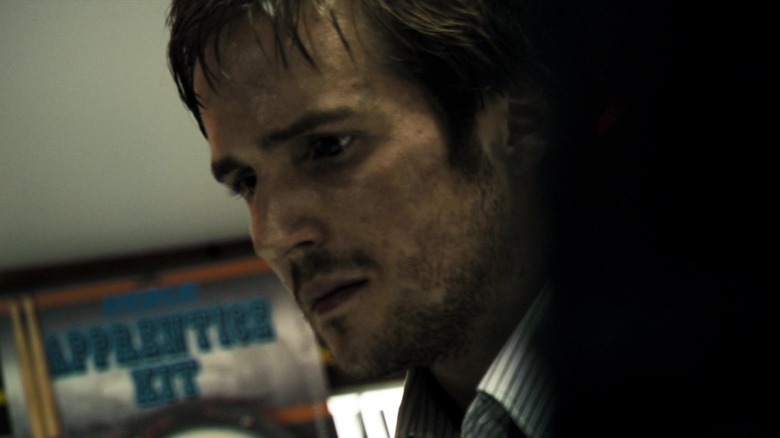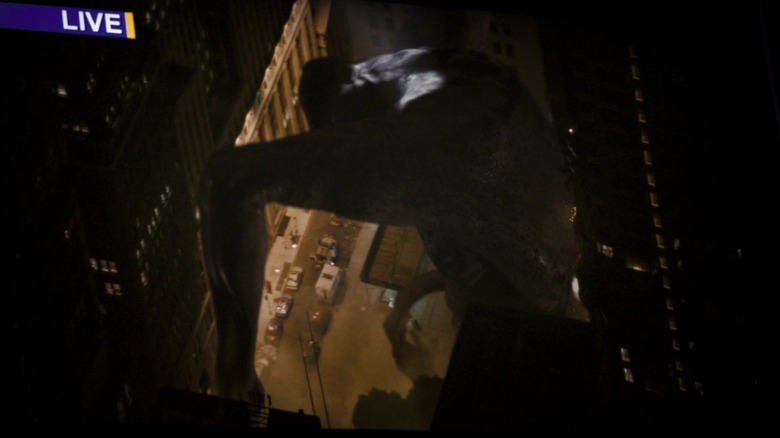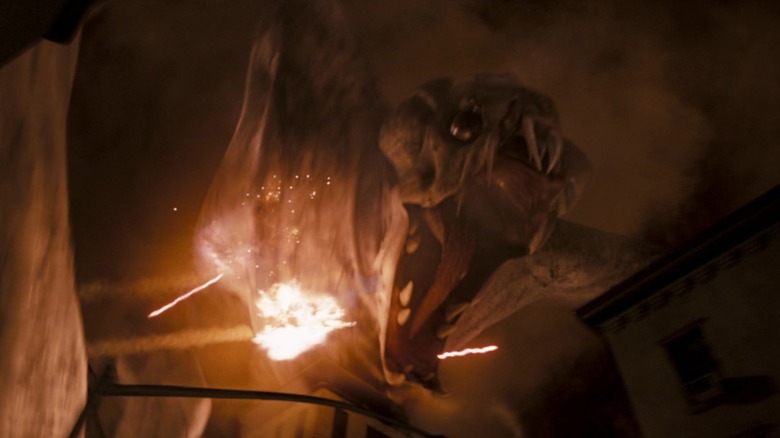Matt Reeves Had Decided Whether To Helm Cloverfield Without A Finished Script
Found footage horror has always walked this line of telling a story while keeping the audience suspended in the spontaneity of the moment. In most cases, they're often tragedies, as the very concept of the sub-genre tells you upfront that the folks who left this video behind have either gone missing or that they're already dead. It's a brilliant way for independent filmmakers with a limited budget to get their scares in, without the tools of a major studio backing them up. But every once in a while, a Hollywood staple like Paramount will take a shot at expanding the scope of the form, which is how you get something as unique as "Cloverfield."
The fact that the 2008 found footage monster movie is celebrating its 15-year anniversary in 2023 is wild to me, as it only felt like just yesterday that "Cloverfield" hype had exploded. I vividly remember seeing the enigmatic teaser trailer placed before showings of "Transformers" back in 2007, which had everyone buzzing as to what it could possibly be about. Although I didn't get a chance to watch it in theaters along with everyone else, once I found out about its extensive marketing campaign, I found myself falling down the rabbit hole.
Even beyond its many teases and open ends, "Cloverfield" remains an era-defining monster movie that channels the post-9/11 anxieties of the 2000s into something terrifyingly apocalyptic. It's a tremendous display of controlled chaos that manages to hone the conventions of a traditional horror movie while retaining a sense of unpredictability. Everything about "Cloverfield" feels like such a meticulously coordinated effort form director Matt Reeves, writer Drew Goddard, and producer J.J. Abrams, but when it came to actually making it, there was one noticeable hurdle that they had to get over.
Filming was already set for 12 weeks out
As any filmmaker will know, you go through the rigorous stages of pre-production so that when it comes time to shoot the thing, you're as prepared as you could possibly be. Matt Reeves had shown interest in directing the film, but wanted to wait until Drew Goddard had completed a finished script. The only issue was that there wasn't any time to wait. Reeves explained the situation to The Hollywood Reporter:
"When I first came in, I said to J.J. [Abrams], 'Well, before I determine whether or not I'm going to do it, why don't I wait until Drew Goddard is done with the script?' And he said, 'You can't do that.' And I said, 'Why?' And he said, 'Because we're shooting in 12 weeks.' And I was like, 'What!?' So Drew and I started meeting and talking, and then J.J. came in to talk. And so we started planning this whole thing out, and it all happened so fast."
The "Cloverfield" crew knew they wanted to make a monster movie set from the point-of-view of the people on the ground, but even something like that requires organization. When you're drawing from limited resources, sometimes you just have to work on the fly. A larger-budgeted found footage project like this, however, not only requires shooting in New York, but there's also the matter of planning out the logistics of the film's heavier VFX sequences. I can't even imagine the pressure of having to make a huge commitment to an idea that hasn't even been fully scripted, but they pulled it off.
A tightly-structured narrative is present within the margins, but the appeal of "Cloverfield" lies in how much it sucks you into what feels like a personal accounting of history from an alternate universe.
'The movie was always meant to be the experience'
When that "Cloverfield" teaser first dropped, in classic internet fashion, rumors spread far and wide that it was secretly for a "Voltron" or a "Godzilla" movie, as opposed to an original monster movie told from a first-person perspective. Speaking to The Hollywood Reporter, Matt Reeves talked about the ways the film's marketing skewed folks' perception going in. As he saw it, "Cloverfield" was never about answering all the questions raised by the teaser, it was about capturing the sheer terror of existing in a predicament like the one in the film (wherein a scared monster rampages through New York):
"Some people were frustrated because the marketing was so much about the answers coming, but actually, the movie was always meant to be the experience, which is what really drew me to it. I would give you a kind of visceral ride where you felt like, 'Wow, I was at the center of something and I never quite got the answer, but I got the feeling of what it could be.'"
For all of the ways in which a movie like "The Blair Witch Project" sustains a heightened sense of fear with what you can't see, "Cloverfield" overwhelms the senses by giving you an unfortunate front row seat to the end of the world (at least in the eyes of its characters).
By the time that "Cloverfield" reaches its harrowing ending, it's done what it set out to do. Our protagonists are crushed under the debris of the Central Park bridge, right after exchanging their final declarations of love to one another. Their reconnection was always the "story." In those final moments, "Cloverfield" allows us to witness a small triumph in the midst of dreading their impending doom.
"Cloverfield" is currently available for rental or purchase on most VOD streaming platforms.


